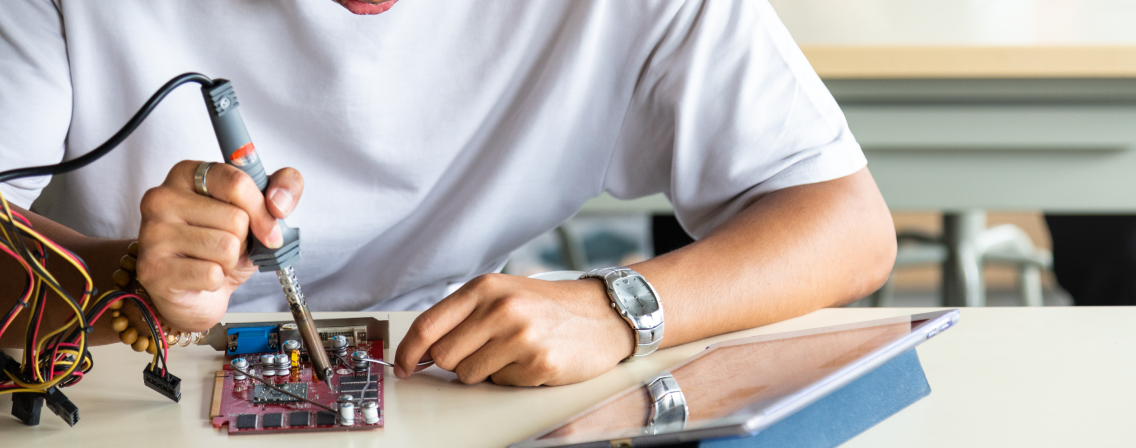Elevating Vocational High School Standards: Enhancing Curriculum and Industry Partnerships

With the growing industries and the expansion of foreign investment in Indonesia, concerns have arisen about the increasing unemployment in the country. Vocational schools are considered a solution, aiming to create more job opportunities by providing skilled workers for industry. However, these efforts appear to contrast with reality, as vocational schools still have a high unemployment rate and struggle to compete with workers holding bachelor’s degrees. This raises concerns about the viability of the job market for vocational graduates. This phenomenon raises a new question about how Indonesia can manage its increasing unemployment rate each year. It also prompts a reevaluation of how to sustain industry growth despite inevitable global economic challenges.
Indonesia, Southeast Asia’s largest economy, aspires to strengthen its economic position through rapid industrial development and innovation. To achieve this, the country requires a well-equipped workforce capable of meeting the demands of emerging industries. Vocational education, designed to provide students with practical, industry-relevant skills, is seen as a key component of this effort. However, despite the emphasis on vocational and technical education, Indonesia is experiencing an anomaly: a high open unemployment rate among vocational high school (Sekolah Menengah Kejuruan, SMK) graduates. As of recent reports, the unemployment rate for SMK graduates stands at a staggering 9.6%, slightly higher than general high school which stands at 8.15%. This contradiction raises the question of what is wrong with Indonesia’s vocational education system, and why it is failing to deliver on its promise of providing employable graduates.
With the growing industries and the expansion of foreign investment in Indonesia, concerns have arisen about the increasing unemployment in the country. Vocational schools are considered a solution, aiming to create more job opportunities by providing skilled workers for industry. However, these efforts appear to contrast with reality, as vocational schools still have a high unemployment rate and struggle to compete with workers holding bachelor’s degrees. This raises concerns about the viability of the job market for vocational graduates. This phenomenon raises a new question about how Indonesia can manage its increasing unemployment rate each year. It also prompts a reevaluation of how to sustain industry growth despite inevitable global economic challenges.
The Mismatch Between Skills and Industry Needs
One of the primary reasons behind the high unemployment rate among vocational high school graduates is the mismatch between the skills they acquire and the actual needs of the industries they aim to enter. Vocational high schools in Indonesia often operate with outdated curriculum that do not align with the rapidly changing demands of modern industries. While the curriculum may focus on traditional skills, industries increasingly require workers who are proficient in newer technologies, digital literacy, and specialized technical expertise. Consequently, graduates find themselves with skills that are no longer relevant or in demand, leading to difficulty in securing employment.
This skills mismatch is compounded by the fact that many vocational schools lack strong partnerships with industry. Effective vocational high school education requires close collaboration between educational institutions and employers to ensure that students are trained in the specific skills that are needed in the workforce. Without such partnerships, vocational schools may continue to train students for jobs that no longer exist or for roles that have evolved in ways the education system has not yet adapted to.
Another factor contributing to the high unemployment rate among SMK graduates is the social perception and stigma attached to vocational education. In Indonesia, as in many other countries, vocational education is often viewed as a less prestigious option compared to academic education. Many students and parents see vocational schools as a fallback for those who are not academically inclined, rather than as a first-choice pathway for skilled employment. This perception can affect the motivation of students and the level of investment in vocational programs, both from the government and private sector. If vocational education is seen as inferior, it will continue to struggle with attracting high-quality students and gaining the support necessary to modernize and improve.

Higher Opportunity in Diploma
In recent years, data on employment in Indonesia have revealed an interesting trend: diploma graduates, who pursue vocational education at the university level, are starting to achieve better employment outcomes compared to both bachelor's degree holders and general high school graduates. According to 2023 data, the unemployment rate for diploma holders stands at 4.79%, which is notably lower than the unemployment rate for bachelor’s degree graduates, which is 5.18%. This trend has been prominent for the last three years, suggesting that higher vocational education provides significant advantages in terms of employment prospects.
One of the key reasons diploma holders have significantly better employment outcomes than SMK graduates or even bachelor's degree holders is the level of specialization and expertise they acquire. Vocational education at the university level tends to be more advanced, providing students with a deeper understanding of their chosen fields and equipping them with specific technical skills that are highly valued by employers. For example, diploma programs often focus on specialized areas such as healthcare, engineering, and information technology, where there is strong demand for skilled workers.
Furthermore, higher vocational education typically involves more extensive practical training, internships, and industry partnerships. These programs are often designed in collaboration with employers, ensuring that the skills students acquire are directly applicable to the labor market. Many SMK programs operate in isolation from industry, leading to a mismatch between the skills taught in schools and the skills required in the labor market.

The Way Forward: Improving Employment Outcomes for SMK Graduates
Improving the quality of vocational high schools (SMK) in Indonesia is essential to increasing employment among graduates. This is especially important because most of the SMK graduates come from low-income backgrounds who cannot pursue a higher education to university level. One crucial aspect of this improvement is curriculum modernization and industry alignment. The SMK curriculum must adapt to the rapidly changing demands of the job market, which can be achieved through stronger partnerships between vocational schools and industries. Regular consultations with industry leaders will help vocational schools update their programs to reflect new technologies and shifts in the economy.
In addition, enhancing access to certification programs for SMK graduates is very important. Certification programs provide formal recognition of the specific skills and expertise that students acquire, offering a significant competitive edge in a job market that increasingly values proof of competency. These programs not only validate the skills taught but also help SMK graduates stand out to employers who are often looking for candidates with verified qualifications. This certificate is not only important for the domestic human capital market but also for the export of human capital abroad, which often opens opportunities for blue-collar jobs overseas.
Finally, increased investment in infrastructure and teacher training is necessary to elevate the quality of SMK education. Many vocational schools are under-resourced, lacking modern facilities and equipment essential for effective training. Improving infrastructure will enable students to engage with up-to-date technology, making them better prepared for their careers. Additionally, ongoing professional development for teachers is vital to keeping them informed of the latest industry trends and practices, ensuring that they can deliver high-quality education that aligns with current job market needs. These investments in infrastructure and human capital are key to equipping SMK graduates with the skills they need to succeed in the workforce.